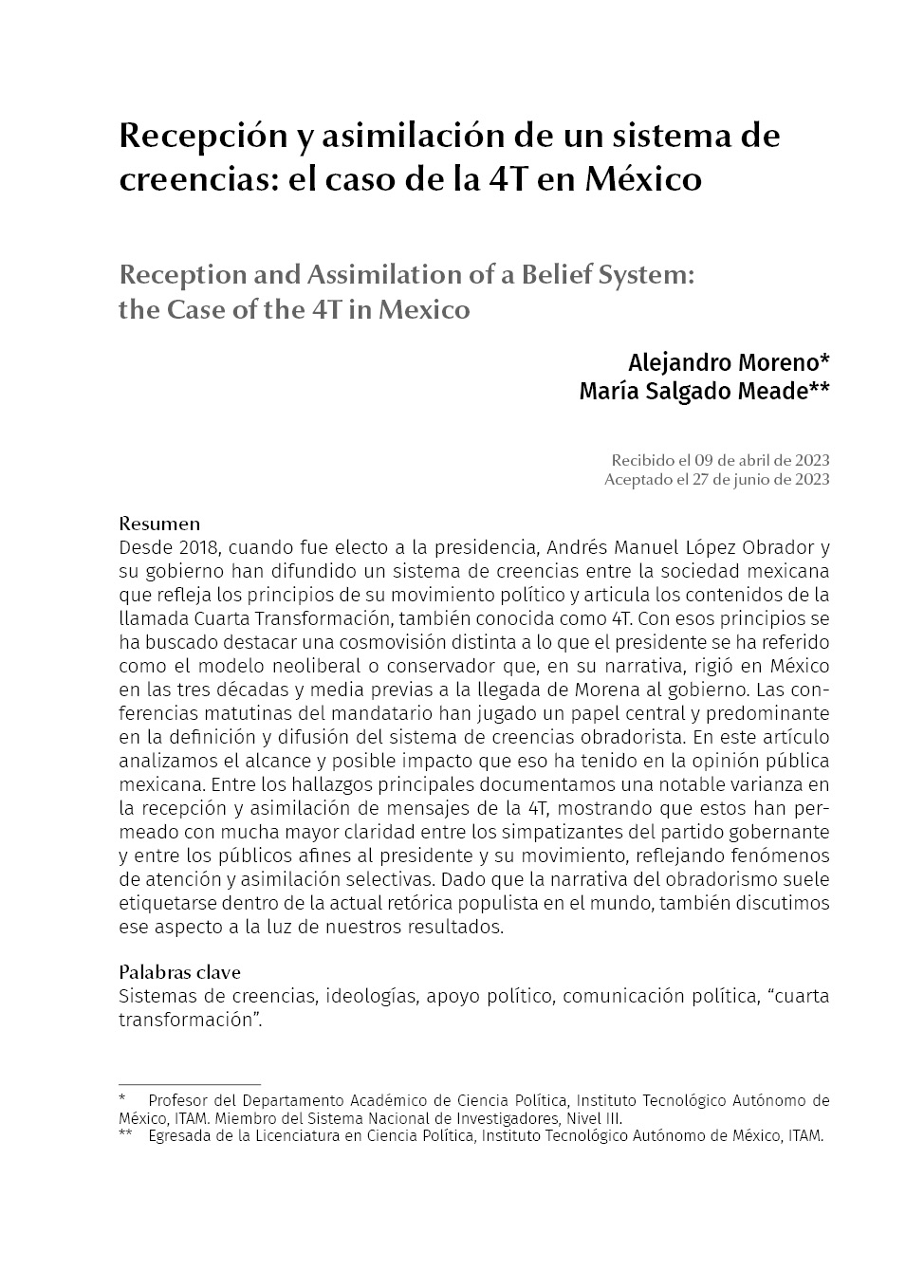Reception and Assimilation of a Belief System: the Case of the 4T in Mexico
Main Article Content
Abstract
Since 2018, when he was elected to the presidency, Andrés Manuel López Obrador and his government have spread a belief system among Mexican society that reflects the principles of his political movement and articulates the contents of the so-called Fourth Transformation, also known as 4T. With these principles, an attempt has been made to highlight a different worldview from what the president has referred to as the neoliberal or conservative model that, in his narrative, governed Mexico in the three and a half decades prior to Morena's arrival in government. The president's morning press conferences have represented a central and predominant space for the definition and dissemination of the obradorist belief system. In this article, we analyze the scope that it has had among Mexican public opinion. Among the main findings, we document a notable variance in the reception and assimilation of 4T messages, showing that these have permeated much more clearly among supporters of the ruling party and among publics related to the president and his movement, reflecting phenomena of selective attention and assimilation. Given that the obradorism narrative is usually labeled within the current populist rhetoric in the world, we also discuss this aspect in light of our results.
Article Details
Citas en Dimensions Service
References
Applebaum, A. (2021). El ocaso de la democracia: la seducción del autoritarismo. México:
Penguin Random House.
Castro R., Ley S., y Beltrán U. (2020). “Enojo, identidad partidista y la activación populista
del electorado en México”. Política y gobierno, 27(2).
Converse, P. E. (1964). “The Nature of Belief Systems in Mass Publics”. En Ideology ad Dis- content, David E. Apter (compilador). New York; Free Press.
Díaz-Domínguez, A. y Moreno A. (2015). “Effects of #YoSoy132 and Social Media in Mexico’s 2012 Presidential Campaigns”. En Mexico’s Evolving Democracy: A Comparative Study of the 2012 Elections. Jorge I. Domínguez, Kenneth F. Greene, Chappell H. Lawson, Alejandro Moreno (eds). Baltimore: Johns Hopkins University Press
Espino, L. (2021). López Obrador: El poder del discurso populista. Ciudad de México: Turner. Fieschi, C. (2019). Populocracy. The Tyranny of Authenticity and the Rise of Populism. New-
castle, Agenda publishing.
Friedman, J. (2006). “Democratic Competence in Normative and Positive Theory: Neglected Implications of ‘The Nature of Belief Systems in mass Publics’.” Critical Review, 18(1-3). pp I-XLIII.
Kinder, D. R. y Kalmoe N. P. (2017). Neither Liberal nor Conservative: Ideological Innocence in the American Public. Chicago: The University of Chicago Press.
Moffitt, B. (2016). The Global Rise of Populism: Performance, Political Style, and Representa- tion. Stanford: Stanford University Press.
Moreno, A. (2006). “Estabilidad y consistencia ideológica en la opinión pública mexicana”
Revista Mexicana de Opinión Pública, 1(1), pp. 11-34.
Moreno, A. y Martínez, T. (2006). “Información política e imagen de candidatos en las cam- pañas presidenciales de 2006”. Revista Mexicana de Opinión Pública, 1(2), pp. 29-51.
Moreno, A. (2018). “¿La cuarta qué?”. En El Financiero, 30 noviembre. Moreno, A. (2022a). “¿Cómo se percibe la 4T?”. En El Financiero, 28 octubre.
Moreno, A. (2022b). “El pueblo y la ciudadanía”. En El Financiero, 4 noviembre.
Moreno, A. (2023a). “Aprobación de AMLO se mantiene intacta en febrero: 54%”. En El Finan- ciero, 1 marzo.
Moreno, A. (2023b). “Los dichos de AMLO”. En El Financiero, 3 marzo.
Moreno, A., Uribe A. y Wals S. (2019). El viraje electoral: Opinión pública y voto en las elec- ciones de 2018 en México. México, CESOP, Cámara de Diputados.
Müller, J. W. (2016/2017). ¿Qué es el populismo? Ciudad de México: Grano de sal.
Nie, N. H., Verba S. y Petrocik J. (1979). The Changing American Voter. Cambridge: Harvard University Press.
Norris, P., e Inglehart, R. (2019) Cultural Backlash: Trump, Brexit, and Autrhoritarian Populism.
Cambridge: Cambridge University Press.
Salgado M. (2023). Construcción retórica de la 4T como nuevo sistema de creencias: su difusión y adopción entre la opinión pública mexicana. [Tesis de licenciatura inédita] Instituto Tecnológico Autónomo de México.
Zaller, J. (1992). The Nature and Origins of Mass Opinion. Cambridge: Cambridge University Press.

Revista Mexicana de Opinión Pública por Universidad Nacional Autónoma de México se distribuye bajo una Licencia Creative Commons Atribución-NoComercial-SinDerivar 4.0 Internacional.
Basada en una obra en http://revistas.unam.mx/index.php/rmop.




